The effect of small firms’ competitive strategies on their community and environmental engagement
Journal article, Peer reviewed
Date
2016Metadata
Show full item recordCollections
- Scientific articles [2181]
Original version
Journal of Cleaner Production, 129(2016): 578-585 http://dx.doi.org/10.1016/j.jclepro.2016.03.141Abstract
Corporate social responsibility (CSR) literature holds that CSR can help firms gain a competitive advantage by enabling them to differentiate themselves from their competition and reduce costs. In the strategy literature, differentiation and cost reduction are recognized as two major competitive strategies that firms pursue to outcompete rival firms. Yet, how CSR is linked to a firm's choice of competitive strategy is not explicitly explored in the extant literature. The present paper fills this gap. Using data collected from 478 small firms representing multiple industries in the US, this paper finds that a firm's focus on competing through differentiation strategy is associated with its level of community engagement but not with its level of environmental engagement. Competing through a strategy of cost-leadership is associated with neither community nor environmental engagement. The paper concludes that, except for seeking differentiation through community engagement, the approach of small firms to CSR remains largely characterized by adhoc decisions with few ties to their competitive strategies. The paper advances the understanding of CSR in small firms and provides novel insights into how CSR is linked with competitive strategies.
Description
This is the accepted, refereed and final manuscript to the article
